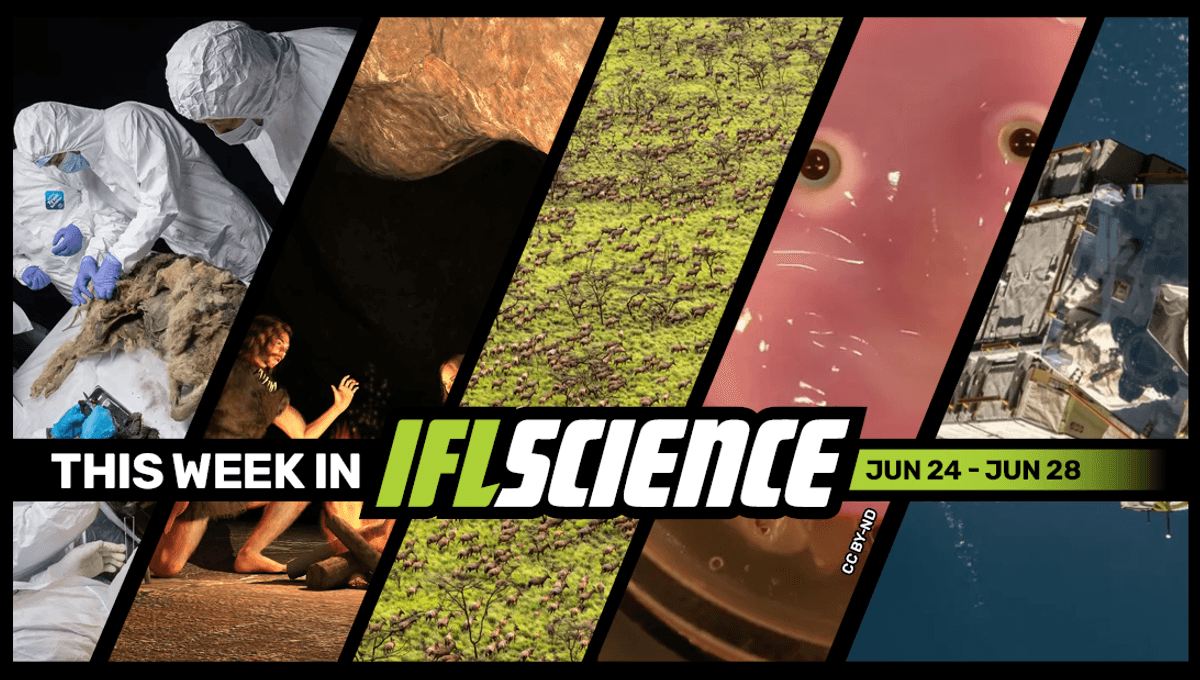
This week, freshly analyzed Neanderthal remains suggest our extinct relatives were caring and compassionate, researchers spotted the world’s largest land mammal migration ever recorded, and a robot with a face made out of lab-grown human skin became everyone’s new nightmare. Finally, we explore how some physicists once believed the explosive Tunguska event was actually caused by a black hole passing through the Earth.
Subscribe to the IFLScience newsletter for all the biggest science news delivered straight to your inbox every Wednesday and Saturday.
A 44,000-Year-Old Wolf Frozen In Permafrost May Still Contain Living Bacteria
A prehistoric wolf that’s been frozen like a popsicle for over 44,000 years has undergone a post-mortem in Russia, set to reveal all kinds of insights into its life as an apex predator in the Ice Age. Read the full story here.
Neanderthal Child With Down Syndrome Highlights Altruism Among Ancient Humans
Researchers in Spain have discovered the remains of a Neanderthal child displaying a number of traits that are consistent with Down syndrome. However, unlike other prehistoric individuals with the condition, the youngster didn’t die as a baby, indicating that both the child and its mother received ongoing care and support from the rest of their ancient tribe. Read the full story here.
Six Million Animals Make Moves In The World’s Largest Land Mammal Migration
Around 6 million antelope have been recorded on a trek across East Africa, marking the world’s largest land mammal migration ever recorded. Read the full story here.
Watch This Uncanny Robot Face Grin And Frown Thanks To Self-Healing, Lab-Grown Human Skin
This grinning pink blob might populate your nightmares for the next week or two (sorry about that), but if you can see past the all-too-realistic eyes, you’ll find a very impressive feat of engineering. Scientists in Japan have figured out a way to attach lab-grown human skin tissue to the faces of complex humanoid robots. Read the full story here.
Family Sues NASA In Unprecedented Case After Piece Of ISS Smashes Into Their House
A family in Florida has launched a lawsuit against NASA, seeking compensation after a piece of space junk fell from the sky and crashed through the roof of their house. Fortunately, no one was injured in the incident, although the family’s lawyer says the ramifications of this case go far beyond mere damage reparation and could set a precedent for how future claims of this sort are resolved. Read the full story here.
TWIS is published weekly on our Linkedin page, join us there for even more content.
Feature of the week:
Physicists Once Proposed The Tunguska Event Was Caused By A Black Hole Passing Through Earth
Every year on June 30, Earth celebrates Asteroid Day to mark the date of Earth’s largest asteroid impact in recorded history and raise public awareness of asteroid impact hazards and the crisis communication plans should one head our way. Now we know the Tunguska event of 1908, which flattened over 2,000 km2 of forest in Siberia, was likely an airburst from an asteroid, but physicists once proposed it was a primordial black hole passing through Earth. Read the full story here.
More content:
Have you seen our e-magazine, CURIOUS? It’s about to turn 2! Issue 24 July is out on June 30, and Issue 23 June 2024 is available now. Check it out for exclusive interviews, book excerpts, long reads, and more.
PLUS, the first episode of season 4 of IFLScience’s The Big Questions Podcast is out now.
Source Link: A 44,000-Year-Old Frozen Wolf May Still Contain Living Bacteria, Family Sues NASA After Piece Of ISS Smashes Into Their House, And Much More This Week